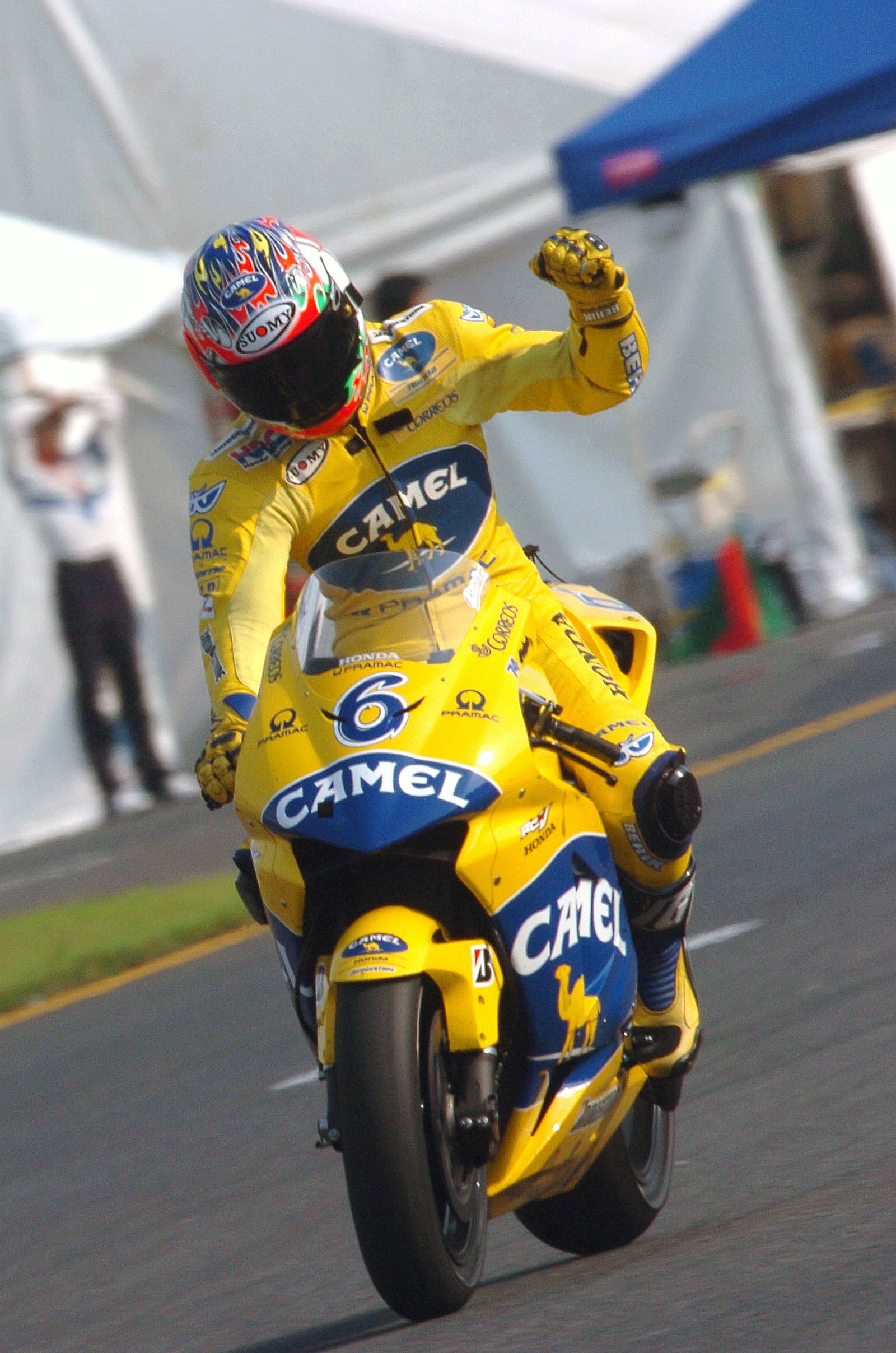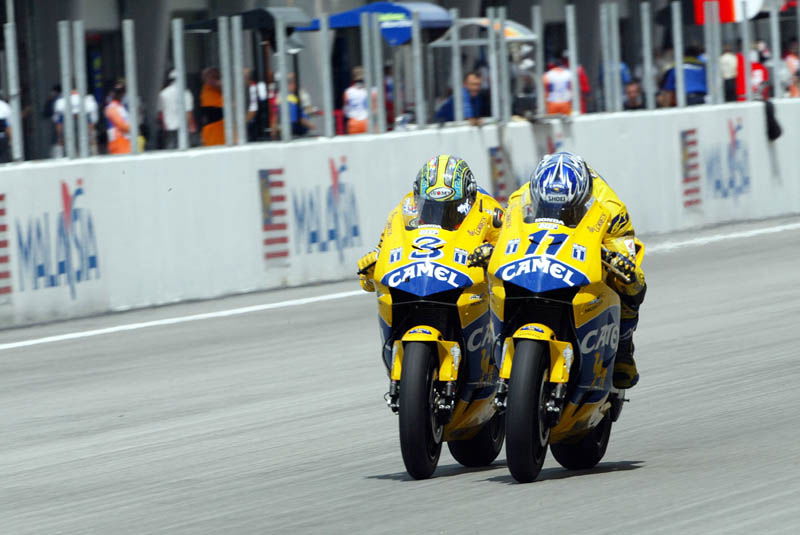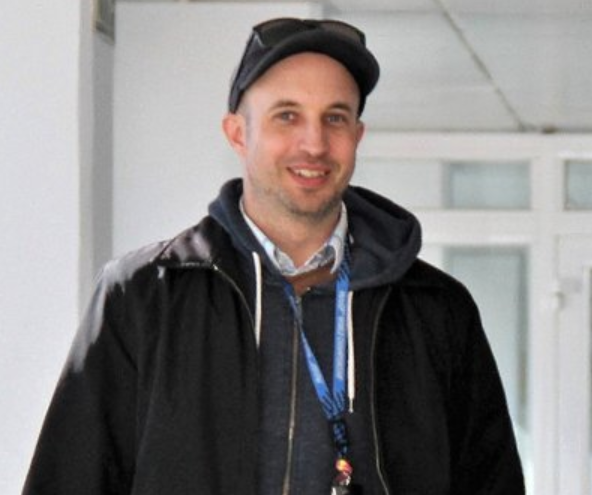Michael Scott column: When Rossi goes.
In the latest of his exclusive columns for Crash.net, Motocourse editor Michael Scott considers the impact of MotoGP superstar Valentino Rossi departing for Formula One - an event now tipped to occur, with Ferrari, in 2007...
The writing is on the wall. The axe is to fall on Motorcycle Grand Prix racing in 2007. That's when Valentino Rossi decamps for Ferrari and Formula One.

In the latest of his exclusive columns for Crash.net, Motocourse editor Michael Scott considers the impact of MotoGP superstar Valentino Rossi departing for Formula One - an event now tipped to occur, with Ferrari, in 2007...
The writing is on the wall. The axe is to fall on Motorcycle Grand Prix racing in 2007. That's when Valentino Rossi decamps for Ferrari and Formula One.
Not only will Rossi be gone. Also his entourage, ranging from his ex-pony-tailed dad Graziano sleeping in the back of his car at the races, via a growing management and comfort entourage, to the vast armies of fans - whole hillsides of them at some tracks, wearing yellow, waving yellow, living yellow...
Motorbike racing will have to bite the bullet. There are reports that Yamaha "will fight to keep Rossi in MotoGP". Dream on. What racer would decline an invitation to drive a factory F1 Ferrari? Especially an Italian. And especially one who is overflowing with natural talent, as well as racing intelligence and application, and has a tendency to get bored when things get too easy.
F1 should be pleased to get him. And they know it. The attention he commanded at his recent visit to Monza was proof enough. The comparatively bland biggest big-time of racing could do with a new hero with a bit of red blood in his veins.
Motorcycle racing should be proud to have had him. But there will be many who will view his departure as some kind of a betrayal. There lingers on in motorcycling a deep-seated resentment to cars and all that has to do with them. I suspect the reverse is true in car racing.
How else could a man as well-mannered and gentlemanly as six-times 350 & 500 World Champion Geoff Duke have been made to feel like a counter-jumper, a social outcast, when he joined Peter Collins and his circle of snobby mon-ami-mates for a brief and ultimately fruitless stint in the Aston Martin factory endurance team in the Fifties?
It is entirely artificial, this division between two and four wheels, and nobody understands this better than the Italians. They have done so since even before Tazio Nuvolari moved on from his factory ride with the Bianchi motorcycle team between the wars, to become one of car racing's greatest icons.
The feeling persists, however. In Britain and many other places it is a social distinction. And like most such, misses the point completely.
For more realistic reasons, however, the division has also deepened in the years since John Surtees straddled the divide, taking a string of seven bike titles with him to F1 and Ferrari, where he became the first and so far only racer to win the World Championship on two and four wheels.
Others before and since have tried - Sixties bike hero Bill Ivy was tipped for a big future in cars, but was tragically killed in a bike outing before he could prove it. Giacomo Agostini also flirted with Ferrari, but the association was short-lived and quickly forgotten.
Venezuelan shooting star of the Seventies Johnny Cecotto was a nearly-man of car racing. Even the great Mike Hailwood, nine times bike World Champion, was unable to do more than tickle at the upper echelons of F1.
One reason for the widening of the gulf is that sportsmen start younger and specialise more today. In motorcycling, it's nowadays unheard of to tackle more than one class at a time, when it used to be quite normal (one thing Hailwood managed that Rossi never will was to win three classes in one day). And when compared with cars, today's bike heroes were cutting their teeth on pre-teen minimotos while F1 drivers were doing it on karts.
Rossi has the chance to prove that the person is more important than conventional wisdom.
Clearly, there is common ground between car and bike racing. In each, the pilot needs a special relationship with dynamic physics, once described by King Kenny Roberts as "having a gyroscope up your ass". Courage and confidence are prerequisites, some mechanical understanding and sympathy an asset. Rossi excels in all aspects.
The hardest thing to learn, they say, is how much shorter the braking distances are in a car, and how much higher the corner speed. Nobody who has watched Rossi proceed from 125s to 250s to 500s to MotoGP can doubt that Rossi will be a quick learner.
What else would Rossi take with him from bikes?
Firstly, an intimacy of understanding of surface, and of rubber's response to surface, polished over many years. No car driver ever does anything as delicate as a bike rider, when he's still braking hard and initiating the turn in to a corner, on a wet track. The connection between the tiny front tyre contact patch and the rider's brain must be intimate and almost telepathic.
Secondly, experience of close racing, and a special kind of race-craft, where you need to react to the moment as well as understand the progress of the whole race. With it comes experience of very close rivalry - in the sense of being elbow to elbow, bodywork touching.
And (a real asset in F1) no fear of overtaking.
Valentino will bring something else that will lift him clear of the F1 grid - charisma, personality and humanity. These qualities, along with his talent, have already made him a god. Qualities possessed, without doubt, by many top F1 drivers, but tuned out of them long before they became famous by the relentless depersonalisation and mediocratisation of the marketing and PR machines.
What will Valentino leave to motorcycle racing? Other than an aching void?
A very important legacy.
To HRC, he taught the lesson that the man is more important than the machine. Or can be, if he is the right man.
Rossi's legacy to Yamaha is similar, and will ultimately have as bitter-sweet a taste. He taught them that all sorts of things are possible, if you work not merely hard (as is the Japanese habit), but in only the right direction.
His legacy to motorbike racing is also double-edged.
On the one hand, he has given us a share of a particular kind of self-respect, retaining his own integrity and that of bike racing, under an unprecedented scrutiny from an adoring outside world.
On the other, his stature has dwarfed and belittled all the other riders, so that Gibernau (for example), in spite of fine achievements and heroic lap times, is tagged a loser. Whoever wins the title the year Rossi goes will enjoy an inevitably diminished victory.
It is impossible not to wish Rossi well in F1, and impossible not to dread his departure. Should he succeed (and why the hell would he not, a competitor of his quality), it will bring further distinction to his motorcycle titles.
But it's going to be painful to say goodbye. Bike racing will need all the self-respect it can muster, to survive the hard times after Rossi goes.


